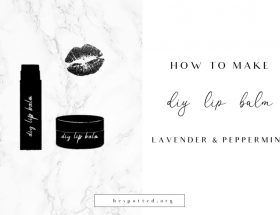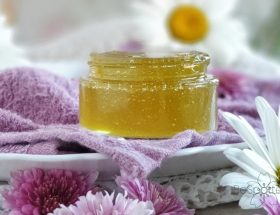This post may contain affiliate links. Any sales made through such links will reward me a small commission – at no extra cost for you!
Hyaluronic acid is included in so many skin care products we use every day. You’ll find it in day and night face creams, serums, toners, masks… So, what are the benefits of hyaluronic acid for skin and should you too consider using it?
Whether you obsessively read labels on beauty products or you only catch beauty ads in passing, the chances are you’ve heard of hyaluronic acid. It seems that it’s included in so many cosmetics brands and types of products, you just couldn’t have missed it.
Celebrities use it, dermatologists recommend it, and if you go through your own beauty kit, you’ll probably find something that contains it.
So, what’s the buzz all about? Is hyaluronic acid one of those ingredients that come and go with the season? It doesn’t seem so. In fact, more and more women now choose their moisturizer based on whether it contains hyaluronic acid or not.
Though it is not almighty (or even the best ingredient out there), hyaluronic acid is definitely a useful addition to your skin care game. We’ll talk about the benefits of hyaluronic acid for skin in a second. But first let’s see what exactly hyaluronic acid is…
READ NEXT: 10 Best Hyaluronic Acid Serums
What Is Hyaluronic Acid?
Hyaluronic acid is a humectant that is naturally present in the skin. It can be found throughout your whole body, but around 50% of it is in the skin.
Unlike what its name suggests, this is not a type of acid that could burn or irritate your skin. Technically, hyaluronic acid is a glycosaminoglycan – basically a large sugar molecule. And it is in charge of keeping your skin youthful, supple and well hydrated.
Hyaluronic acid is not a part of skin cell itself. It is rather a part of the cell’s surroundings and as such it has a great impact on the optimal functioning of skin cells.
What Are The Benefits Of Hyaluronic Acid For Skin?
To function normally, one of the things skin needs the most is water – 64% of the skin is water. In fact, loss of water in skin, as well as in the whole body, is one of the main signs of ageing.
Probably the most important characteristic of hyaluronic acid is that it can attract and retain a lot of water – even up to 1000 times its weight. This has pushed hyaluronic acid to the top of the list of the best humectants – substances able to attract water molecules from the surrounding air and that way hydrate the skin.
As we already mentioned, hyaluronic acid is naturally found in our body (nature knows the best!) and all the amazing benefits of it – like plumpness, soothing effect and keeping aging signs at bay – should come as free, right?
The trouble is – as we age, the amount of hyaluronic acid in our skin significantly decreases. So, basically, we need some outer source to replace all the precious molecules we lose over the years.
Hyaluronic Acid in Skincare Products
Hyaluronic acid is pretty big molecule. Practically, this means it won’t get absorbed easily into the skin, but rather stay on the surface, impregnating the skin’s protective barrier and helping lock in the moisture.
Though this feature of hyaluronic acid helps your skin a great deal, the question is – what about the inner layers of the skin? How to deliver hyaluronic acid into the deeper layers and hydrate them as well?
Sodium hyaluronate is a salt of hyaluronic acid that has the same impact on the skin as HA, but much smaller molecular weight. This helps it to penetrate deep into the skin and supply it with water molecules.
Some of the best moisturizers and serums contain both hyaluronic acid and sodium hyaluronate, ensuring you get the best out of both.
Products containing hyaluronic acid can help you:
- get plump, firm skin
- reduce fine lines
- minimize aging signs
- get rid of dull, dehydrated skin
- recover dry skin
- hydrate oily skin
- get skin that is supple, soft and smooth
- get bright, youthful complexion
Which Skin Types Can Benefit From Hyaluronic Acid?
You practically cannot find an anti-aging product that doesn’t contain hyaluronic acid. As we age, our skin loses its ability to retain water. This is one of the culprits that lead to the aging signs appearance, like sagging skin, wrinkles and fine lines and dull, lifeless complexion.
Naturally, replenishing aging skin with water is one of the main steps of anti-aging routine. That is why hyaluronic acid plays such a big role in anti-aging products.
However, aging skin is not the only one that needs extra hydration. Dry skin, for example, doesn’t have the ability to lock in the moisture. Even oily skin needs regular hydration, since this skin type is often very dehydrated. You can also safely use hyaluronic acid for skin that is sensitive or reactive.
As you can see, benefits of hyaluronic acid for skin are vast and varied. Simply put, there is no skin type that couldn’t use some extra moisture. The only difference is – for some skin types that is more mandatory than for others.














Very good info. Thank for this.
I am sorry I am a guy asking this question. This sounds very healthy for skin. Can I also use hyaluronic acid based products..or is it like only for ladies?
Hi there,
First of all – I’m super excited to see that guys also visit our little girls’ sanctuary, so – welcome!!!
And yes, of course you can also use hyaluronic acid products! Men’s skin also needs hydration, right?
The great thing about HA products is that they are usually very lightweight, so they won’t make your skin greasy or shiny.